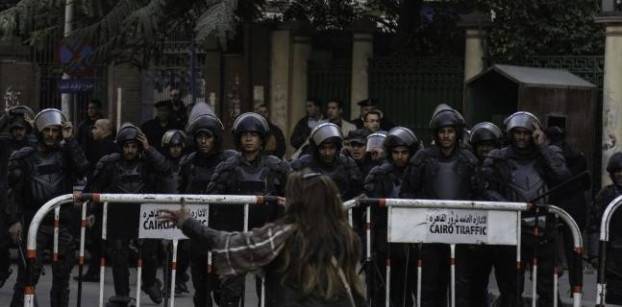Egyptian NGO files lawsuit to effectively repeal century-old assembly law

Security forces dispersed a protest against Tiran, Sanafir agreement on Monday. Credit: Mohamed El- Raai
CAIRO, Feb 1 (Aswat Mariya) - The Cairo Institute for Human Rights Studies (CIHRS) filed a lawsuit with the Administrative Court to halt the implementation of a century-old Assembly Law that it found has been repealed 89 years ago by Egypt's parliament, according to its press statement on Tuesday.
CIHRS published its report "Toward the Emancipation of Egypt" detailing the historical, legal and political context within which the Assembly Law was issued.
Law 10/ 1914, known as the Assembly Law, dates back to 1914, imposed during the British colonial era. It continues to be used by the Egyptian courts along with the controversial protest law passed in Nov. 2013, leading to the imprisonment of thousands of "peaceful Egyptian demonstrators", CIHRS said.
The lawsuit filed by CIHRS seeks the "official promulgation" of the law that repealed the Assembly Law nearly a century ago, thereby effectively repudiating the Assembly law and obliging the courts not to implement it.
"It’s time President Abdel Fattah el-Sisi takes the initiative to immediately renounce this historic and legal indignity by abolishing the British colonial administration law, originally designed to suppress Egyptian resistance to occupation," CIHRS Director Bahey eldin Hassan said.
According to Egypt’s program manager at CIHRS Mohamed Zaree, post-colonial national governments relied on the Assembly Law "as a reference for supplementary repressive legislation and codified even the use of lethal force against peaceful demonstrators", in reference to the protest law and an interior ministry decree regarding the use of force by the police.
The NGO thus challenged the legitimacy of the Assembly Law before the court as Hassan emphasized that its continued "illegal implementation" hinders justice.
Legal researcher at CIHRS Mohamed al-Ansary stated that the Assembly Law "saves courts the trouble of finding a basis for criminal liability for every citizen, which is a core part of their work in realising justice."
"Crowding" is used as a charge to indict every citizen who participated in the assembly or called for it, resulting in mass sentences issued by courts "indiscriminately" against all demonstrators, according to al-Ansary.
Thousands have been detained and convicted on protest charges since the adoption of the protest law which came under heavy scrutiny from local and international rights groups.
Rights lawyers filed in September 2014 lawsuits appealing articles 8 and 10 of the protest law, and suggested several amendments to the law in its current format.
In December, the Supreme Constitutional Court (SCC) said that article 10 of the protest law was unconstitutional. The article tackles the authority of interior ministry in blocking protests. The court also decided to terminate the second part of the same article.









facebook comments